Are you pregnant and nervous about gaining excess weight over the next nine months?
Want to know how to minimize your weight gain?
I have got you covered!
In this post you are going to learn:
- The minimal amount of weight you need to gain in pregnancy,
- How to gain only the recommended weight, and
- Tips you could follow to keep weight gain to a minimum
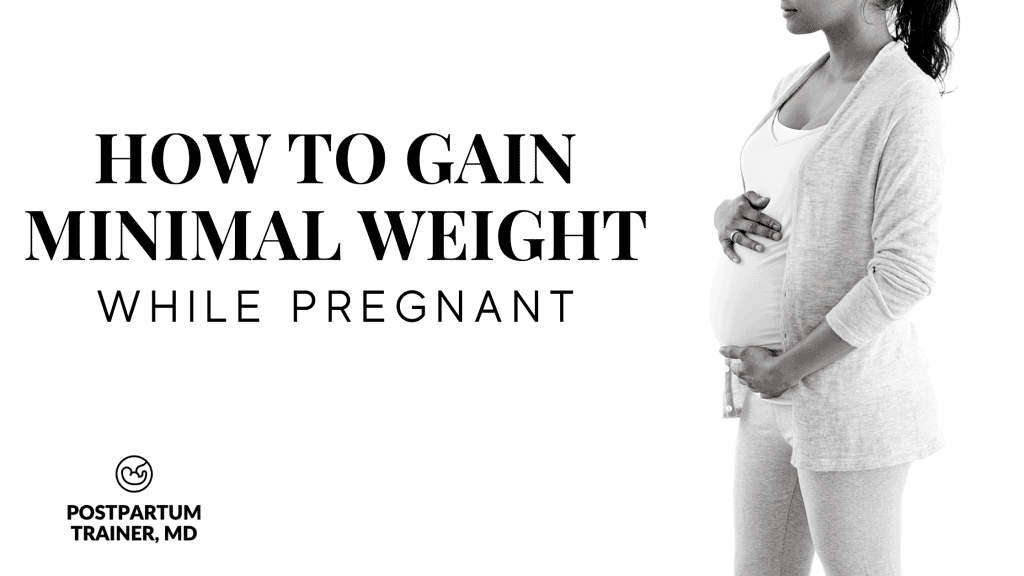
Is it possible to gain no weight during pregnancy?
It is possible to gain no weight during pregnancy if your pre-pregnancy weight is considered obese (which is a body mass index (BMI) >30).
The higher your BMI, the less weight you will need to gain.
With that said, this is an individualized discussion you should have with your healthy care provider.
If you are obese, you will be followed closely throughout your pregnancy for monitoring of you and your baby.
What is the minimum amount of weight to gain during pregnancy?
According to the Institute of Medicine, the minimum amount of weight you should gain during your pregnancy depends on your pre-pregnancy BMI.
If you are underweight (BMI <18.5), the minimum amount of weight you should gain is 28lbs.
If you are normal weight with a BMI between 18.5 and 24.9, you should gain at least 25 lbs.
If you are overweight, BMI 25-30, a weight gain of 15 lbs may be sufficient.
And lastly, if you are obese with a BMI >30, the minimum amount of weight to be gained during pregnancy is 11 lbs.
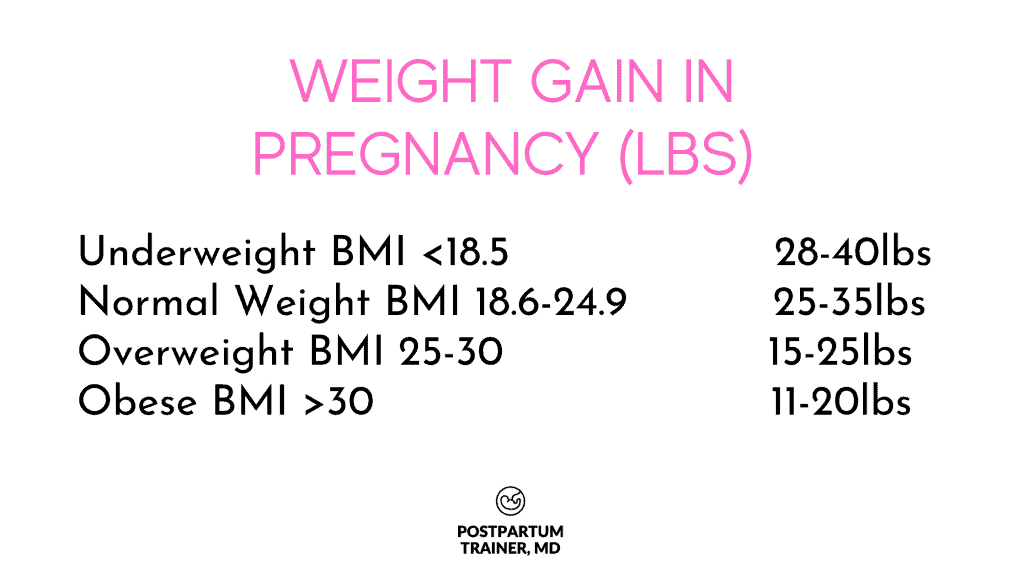
In case you don’t use the metric system, here is weight gain during pregnancy in kg.
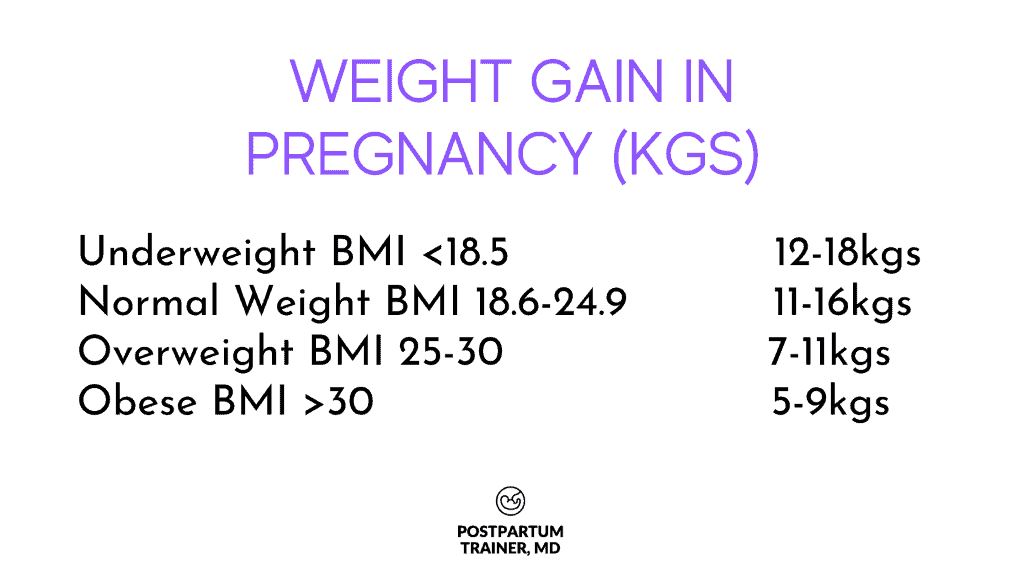
These are obviosuly just guidelines.
If your BMI is >35, your minimum required weight gain may be less.
Weight gain below these recommendations for overweight and obese women does not appear to have negative effects on the growth of your baby.
If you are underweight or normal weight and you are not gaining an appropriate amount of weight, you will likely be referred for a growth sonogram to ensure your baby is measuring appropriately.
How to Gain Only the Recommended Weight During Pregnancy
To gain only the recommended weight during pregnancy you will need to do five things.
- Ensure you are monitoring your caloric intake,
- Ensure you are drinking enough water,
- Ensure you are consuming highly satiating, yet nutrient-dense foods,
- Ensure you are avoiding processed foods (or at least keeping it to a minimum), and lastly
- Doing your best to stay active
Let’s go over each one in more detail.
Tips For Keeping Weight Gain To A Minimum
Monitor the calories in foods- you don’t need that many extra calories
As a pregnant women you will frequently hear others say things like…
“Just eat it, you’re pregnant, it’s the only time you could eat what you want, when you want, without feeling guilty.”
While you should certainly treat yourself from time to time (you are pregnant after all 🙂 ), it’s important to not get carried away.
This is one of the most important times of your life.
You have a baby growing inside of you that is receiving DIRECT nutrition from you. In other words your baby is DEPENDING on your body to give it absolutely everything it needs to grow and thrive.
Why not provide your baby with the best?
Do you really want to be feeding her/him junk food, french fries, cake, cookies, and ice cream causing high glucose levels, increasing the risk of a big baby and childhood obesity?
These foods are loaded with calories, and do very little for you and your baby nutrition-wise.
So, contrary to popular belief, you are not eating for two. You will only need an additional 350-450 calories per day depending on which trimester you are in.
Keeping excess caloric intake to a minimum can also increase your chances of having a belly only pregnancy.
Drink more water
Drinking water is an easy way to keep weight gain to a minimum during pregnancy.
Water has been shown to
- have thermogenic properties (i.e increase your metabolism),
- decrease your appetite, and
- decrease the likelihood of consuming sugary drinks that are high in calories.
This is such a simple intervention that can greatly improve the health of your pregnancy.
I know it’s hard to remember to drink water. That is why I recommend having a water bottle around at all times.
You could even try drinking 8 ounces of water before each meal as a way to stay hydrated and avoid overeating.
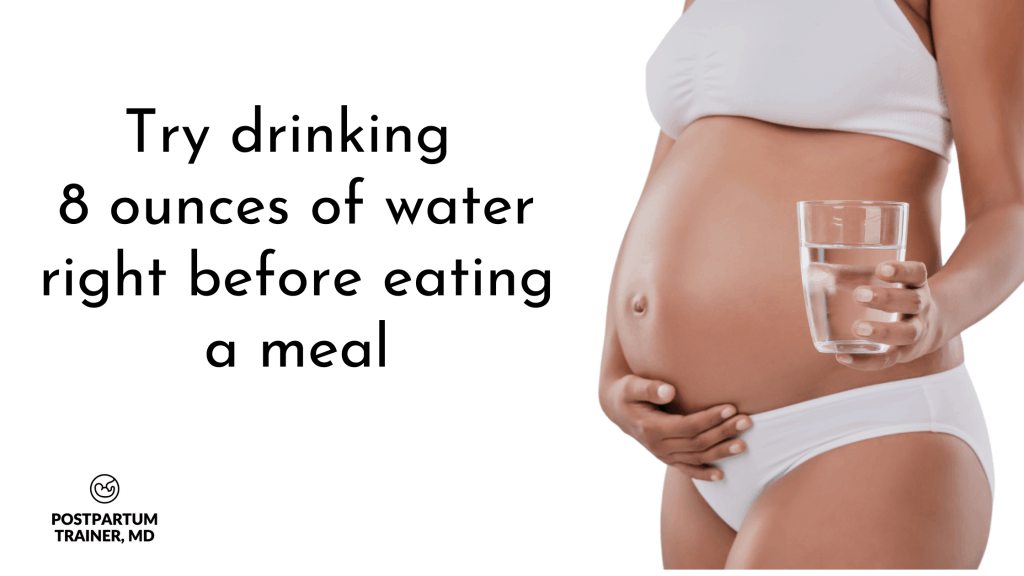
Hydration is also important in preventing preterm contractions. Often times I will see pregnant women in triage with contractions due to dehydration.
They hand over their urine sample which is very concentrated and dark yellow in color.
You want your urine to be a pale yellow color. If it is not pale yellow you must drink more water.
This is the time where you want to DRINK for two people.
Eat highly satiating, nutrient-dense foods
Next you need to pay attention to the food you should eat more of. This includes foods that are “highly-satiating,” i.e, ones that you keep you full.
Highly satiating foods are ones full of protein, fiber, and contain a high water content such as fruits and vegetables.
These foods tend to keep you fuller longer, decreasing your risk of overeating and/or snacking throughout the day.
Some of the best foods you should consume during pregnancy include:
- Walnuts
- Chia Seeds
- Lentils
- Whole grains
- Green leafy vegetables
- Chicken
- Cooked Eggs
- Legumes
- Pasteurized Milk
- Flax Seeds
Do some pregnancy-safe activities
Remaining active during pregnancy is extremely important. I always encourage all my patients to do some type of activity (as long as they don’t have any contraindications to exercise.)
Always check in with your doctor to see if you are medically cleared for activities.
With that said, exercise doesn’t always have to be so formal. Even walking is a great form of exercise during pregnancy.
Regular exercise can decrease your risk of
- Gaining excessive weight,
- Developing gestational diabetes (particularly if you were active before pregnancy),
- Pregnancy related back pain, and
- Developing blood clots
Additionally, exercise keeps your muscles strong allowing you to bounce back quicker postpartum.
If you’d like to get started – check out Getting In Shape While Pregnant [How To Do It Safely].
What happens if you don’t eat enough while pregnant?
If you don’t eat enough during pregnancy you may be putting yourself or your baby at risk.
Just to survive, your body needs a certain amount of calories.
This is known as your basal metabolic rate.
You may not know this, but your body uses up calories just to keep your heart pumping, your lungs distributing oxygen, and for your brain to think!
If you are constantly under-eating, (especially during pregnancy) you run the risk of becoming hypoglycemic. This is when your blood sugar levels drop and you may feel jittery, or even have episodes of syncope, also known as passing out.
In addition, your baby may not get the nutrition it deserves and and may not grow as it should. This can cause your baby to be born small, possibly premature, and require monitoring in a specialized unit for neonates.
I go over this in more detail in Losing Fat During Pregnancy [Everything You Need To Know].
I’m Gaining Too Much Weight During Pregnancy- How Can I Stop?
If you are gaining too much weight during pregnancy you must always take a look at your total daily caloric intake.
The most common reason for excessive weight gain in pregnancy is due to increased calorie consumption.
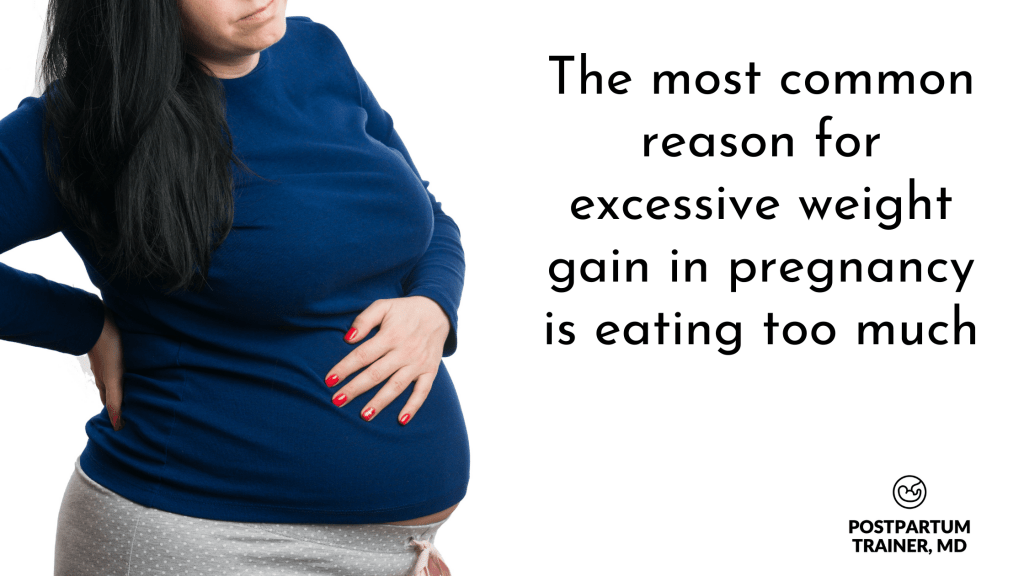
Make sure you are not overeating nutrient-poor foods (such as candy, pastries, juice, soda etc) which may cause you to be hungry all the time.
You must try to eat nutrient-dense food that will keep you full for a long period of time as I mentioned above.
You could also try to engage in exercise which will help you to burn additional calories.
However, before engaging in any sort of activity while pregnant, It is important you receive clearance from your doctor to make sure there is no medical contraindication that would prevent you from exercising.
Other Related Questions
What month of pregnancy do you gain weight?
You gain the most weight during months 6-9 as this is the time your baby starts to grow rapidly.
Below is what you might expect throughout your 9 month journey.
Pregnancy Weight Gain Timeline
During the first trimester, you can expect to gain approximately 1-5 lbs.
It is during the second and third trimester where the weight will start to add up.
Based on your pre-pregnancy BMI you should expect to gain anywhere from 0.5-1 lb per week during the 2nd and 3rd trimester.
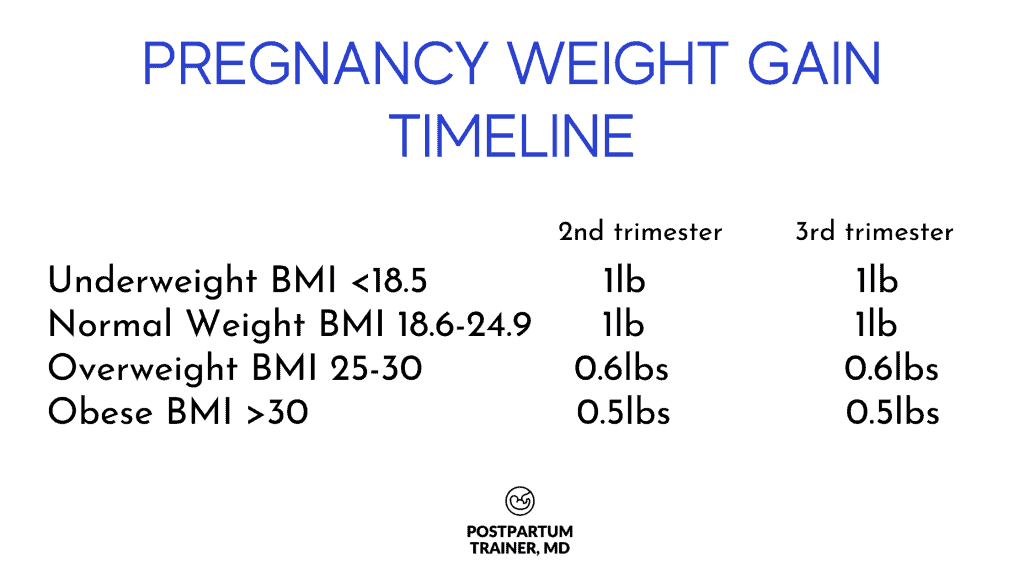
What is the normal weight for a pregnant woman?
The normal weight for a pregnant woman depends on your height. Using your height and your weight, we calculate your body mass index (or BMI).
BMI isn’t a perfect marker for body fat levels, but it’s pretty close.
A normal body mass index ranges from 18.5-24.9.
The chart below lists the height and weight for women with a normal BMI.
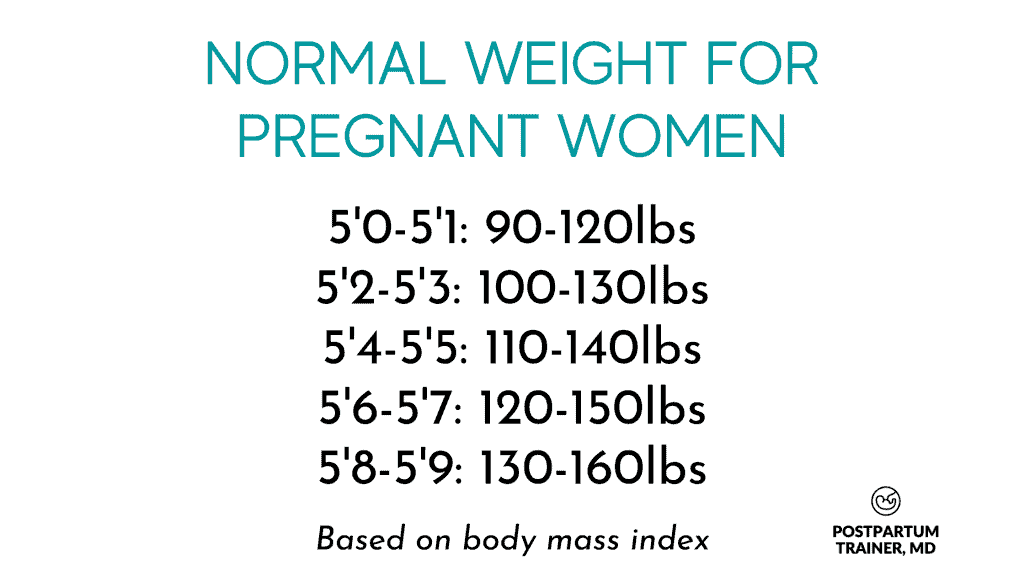
How long can I go without eating while pregnant?
Pregnancy is not a time for intermittent fasting and I do not recommend it.
There may be times throughout your pregnancy where you don’t have an appetite or don’t feel like eating.
I totally get it.
Instead of skipping a meal entirely, make sure to stay hydrated and have a small snack.
Even an apple with peanut butter or a nut butter of your liking, or celery sticks and hummus.
Remember there are organs in your body that rely solely on glucose for energy.
Is it OK to only gain 10 lbs during pregnancy?
If you are considered overweight or obese based on your BMI, it may be okay to only gain 10 lbs during pregnancy.
This will need to be discussed with your provider to ensure your baby is growing and developing well.
If you are underweight or normal weight prior to the your pregnancy, 10 lbs may not be sufficient and may cause long term complications to your baby.
Why am I not gaining enough weight during pregnancy?
There are several reasons why you may not be gaining enough weight during pregnancy and you must answer these questions:
Am I consuming enough calories?
Am I drinking too much water?
Do I have a malabsorption issue?
Am I able to tolerate food?
Do I have significant vomiting or diarrhea?
If you are answering yes to any of these questions you may need to speak with your obstetrician.
Final Words Gaining Minimal Weight While Pregnant
Gaining weight during pregnancy can be done in a very mindful way that is not excessive.
You must take control of your body and the things you are putting into your body.
Remember you want what’s best for your baby right?
Now I want to hear from you.
How much weight did you gain during your pregnancy?
Comment below and let me know!
Related Posts On Weight Gain During Pregnancy
- The Belly Only Pregnancy Guide [Advice from an OBGYN]
- The Fit Pregnancy Diet [How To Follow A Healthy Meal Plan]
- Can You Lose Fat During Pregnancy? [Everything You Need to Know]
Get Four Free Workouts To Help Strengthen Your Pelvic Floor & Heal Your Mommy Tummy!

Brittany Robles, MD, MPH, CPT
Brittany Robles is a full-time OBGYN physician, a NASM certified trainer, and a prenatal and postnatal fitness specialist. She holds a Master of Public Health degree in maternal health with a special interest in exercise and nutrition. She is also the co-author of The White Coat Trainer. Learn more about her here.
Sharing is Caring – Send This To A Mom In Need!
